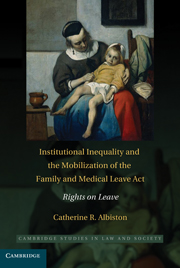Book contents
- Frontmatter
- Contents
- Preface
- Acknowledgments
- 1 Institutions, Inequality, and the Mobilization of Rights
- 2 The Social Institution of Work
- 3 Institutional Inequality and Legal Reform
- 4 Mobilizing the FMLA in the Workplace: Rights, Institutions, and Social Meaning
- 5 Mobilizing Rights in the Courts: The Paradox of Losing by Winning
- Conclusion
- Appendix A
- Appendix B
- References
- Index
- Cambridge Cultural Social Studies
5 - Mobilizing Rights in the Courts: The Paradox of Losing by Winning
Published online by Cambridge University Press: 05 October 2010
- Frontmatter
- Contents
- Preface
- Acknowledgments
- 1 Institutions, Inequality, and the Mobilization of Rights
- 2 The Social Institution of Work
- 3 Institutional Inequality and Legal Reform
- 4 Mobilizing the FMLA in the Workplace: Rights, Institutions, and Social Meaning
- 5 Mobilizing Rights in the Courts: The Paradox of Losing by Winning
- Conclusion
- Appendix A
- Appendix B
- References
- Index
- Cambridge Cultural Social Studies
Summary
WE HAVE SEEN THAT WHEN WORKERS MOBILIZE FMLA rights in the workplace, social institutions shape the meaning of these rights in ways that recreate inequality. Although informal mobilization of rights can challenge deeply entrenched social practices, change through these microlevel interactions can be slow and difficult, because each individual must negotiate the meaning of rights within this institutional context. At least in theory, rights formally mobilized in court are less likely to be displaced or transformed because courts enforce legal principles, not cultural norms. In addition, formal rights claims can force courts to articulate publicly the legitimacy and significance of rights, unlike informal claims that remain largely hidden from public attention (see, e.g., Zemans 1983). In this way, formal rights mobilization produces its own cultural framework for understanding social action in a more visible and authoritative manner than informal workplace negotiations. Thus, from this perspective, adjudication offers a means of shaping public policy and of changing cultural meanings that individuals can access without the need for political clout or a social movement. This claim about formal mobilization raises an important empirical question, however: Do individuals who mobilize FMLA rights in the courts generate legal decisions that affirm the legitimacy of taking leave, and in this way change expectations about work and leave?
Whether a formal rights claim produces a judicial declaration of the public values embodied in a statute depends in part on the institutional rules that determine how courts consider and resolve cases.
- Type
- Chapter
- Information
- Institutional Inequality and the Mobilization of the Family and Medical Leave ActRights on Leave, pp. 187 - 234Publisher: Cambridge University PressPrint publication year: 2010

